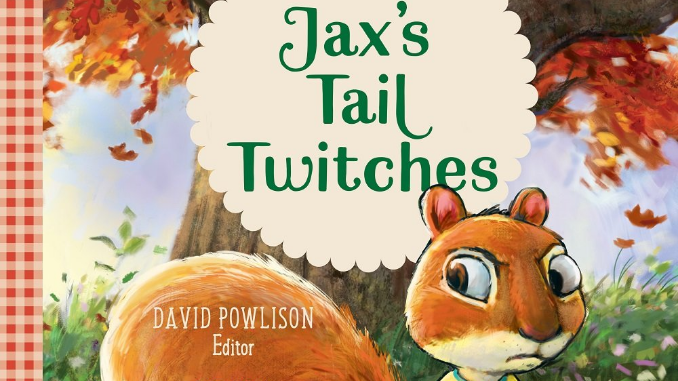
Series: Good News for Little Hearts #2
Published by New Growth Press on October 2018
Genres: Children's, Children's Educational
Buy on Amazon

Everyone gets frustrated when something important to them goes wrong. In Jax’s Tail Twitches, the whole Squirrel family ends up out of sorts when acorn gathering doesn’t go according to plan. Although Papa, Mama, Jax, and Caspian Squirrel all get angry, they also learn about the power of saying sorry, seeking forgiveness, remembering God’s words, and praying together. Edited by David Powlison, Jax’s Tail Twitches ends with a special section that guides parents in teaching children how the gospel of Jesus Christ changes how we respond when life goes wrong. Also included is a tear-out page of Back Pocket Bible Verses that will help children and adults remember to turn to God for help when they are angry.
Learning emotional control can be one of the most difficult things about early childhood (or late childhood…or adolescence…or adulthood). For little ones engaging with these emotions and these heart issues for the very first time, it can be a confusing and troubling experience.
Story, especially for our little ones, becomes a way to experience and understand certain experiences without needing to be in the middle of them. We learn how to respond to anger or anxiety or failure by seeing it modeled in other people—in our life stories—or in fictional characters. Children’s actions and responses are often modeled by the media they consume.
As such, it becomes very important to teach and model appropriate emotional reactions to our children. To help with this, the Christian Counseling and Educational Foundation has partnered with New Growth Press to develop and publish a series of children’s books meant to introduce such topics. The end result is Good News for Little Hearts, written by Jocelyn Flenders and illustrated by Joe Hox.
Jax’s Tail Twitches
In Jax’s Tail Twitches, your little one will learn about the proper response to anger. It’s acorn-gathering time and the squirrel family are about to spend the day preparing for winter. Throughout the day, Jax becomes annoyed that his brother Caspian seems to pick on him. He is also worried that the McNuffles—another squirrel family—will not obey the rule that squirrels can only harvest from the tree they live in.
When the McNuffles inevitably attempt to harvest from the Squirrel family’s tree (the McNuffles are also squirrels…no idea why they get a last name), there is an argument between Papa and Mr. McNuffle. The McNuffles say that they aren’t enough nuts in their tree and are offended that the Squirrels do not want to share. Papa shows Mr. McNuffle where it says in the Squirrel Handbook that squirrels are to only gather from their own tree.
Soon, everybody is angry. Mama is angry because she burnt dinner—and blames Papa for it. Papa is angry that the McNuffles wanted their acorns. But then Jax has a revelation: It seems like we all get angry when we don’t get what we want. We just want different things.
This revelation helps Papa remember that anger is not something God wants us to pursue. Each family member prays and asks God for forgiveness. Then, they go to reconcile with the McNuffles. Papa agrees to share with them and the McNuffles give them some apples in return.
Review
From a literary perspective, this book struggles to know the age and ability of its audience. I evaluated Fleisch-Kinkaid score of one of the pages and found it to be at a fifth-grade reading level. Further, Jax titular tail doesn’t actually play a prominent role (it’s implied that the tail twitches when he’s angry, but not made evident), nor is Jax the lead character. It’s a poorly mapped out story that stumbles its way into an easy answer.
From a counseling perspective, the book does not provide any strategies for dealing with anger (count to 10, take deep breaths, etc.). The message is “God says we shouldn’t be angry,” but if we say that without providing techniques for resolving anger, we aren’t doing our children any good.
Further, the Bible doesn’t actually say not to get angry. “In your anger, do not sin” is Ephesians 4:26. The verse that the book quotes here is James 1:20, which it records as “Anger will not help you live a good life God wants.” What the verse misses is the last words of verse 19, which say to be slow to anger—which contrasts with quick human anger. We should be angry at injustice. We should be angry when things are unfair. Anger is not the problem. How we respond as a result is the issue.
While I enjoyed Buster’s Ears Trip Him Up, I would not recommend this particular volume in the series.
